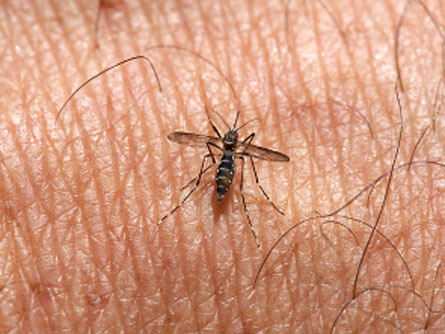Mosquito duets
Bugs sing sweet nothings to each other
By Emily Sohn
 |
|
An Aedes Aegypti mosquito preparing to snack on an unwitting victim.
|
| ALEAIMAGE / iStockphoto |
A mosquito’s whining buzz can be as irritating as its bite. But to a mosquito of the opposite sex, the high-pitched hum is the sound of romance.
Skeeters create their distinctive sound by beating their wings at a certain rate, or a certain number of beats per second. The wing vibrations produce sound waves that resonate in their bodies and outside, too. Now, scientists have discovered that some mosquitoes can adjust the speed of their wing beats — and change the accompanying sound — to attract a potential mate.
In a recent study, male and female Aedes aegypti mosquitoes raised the pitch, or highness or lowness, of their whine when they came within earshot of the opposite sex. By matching the rate at which they beat their wings — as well as their flight tone — the love-struck skeeters were able to perform a singing duet before mating.
To harmonize, the skeeters had to adjust the pitch of their whine to include a quiet tone at 1,200 hertz. This is several times higher than the skeeters’ normal hum. A single female mosquito, for example, generally hums loudest at 400 hertz. Male mosquitoes hum loudest at a tone of 600 hertz.
In the study, Lauren Cator of Cornell University and her colleagues fastened mosquitoes to flexible wires, and then flew the insects past stationary, or still, mosquitoes. The researchers recorded the insects’ flight tones with a specialized microphone. As a male and female flew by each other, their flight tones fell in sync, producing a faint harmonic note that the researchers picked up.
The scientists also implanted tiny electrodes in organs used for hearing in the skeeters’ antennae. The researchers found that this organ is sensitive to sounds of up to 2,000 hertz. The findings were surprising. Until now, scientists didn’t know that mosquitoes could hear such high sounds. In addition, researchers had previously thought that female A. aegypti mosquitoes were deaf.
A. aegypti mosquitoes spread diseases such as yellow fever and dengue fever. The scientists hope that by interfering with the mosquitoes acoustic courtship process, they’ll find better ways to control mosquito populations in places where these diseases occur.
One way to do this would be to trick the females into mating with sterile male mosquitoes, those that can’t produce offspring. This might work because once an A. aegypti female mated with a sterile male, she wouldn’t mate with anyone else. Females tend to shun, or ignore, other males after mating.
Cator and her colleagues note in the study that other disease-carrying insects have been controlled by the release of sterile males. At least A. aegypti females would be serenaded in the process.







